Elementary Tutoring: Early Success Matters!

Elementary tutoring is a good way to help your child keep up with school or catch up after a setback. When young children experience academic problems, the stress and frustration can cause long-term problems. To head that off, remain supportive of your child and offer tutoring as a helpful solution, not a punishment. Whatever you do, don't leave you child to struggle alone.
I've also found that tutoring is an excellent way to challenge a precocious child who is bored in school. A tutor can offer challenging yet appropriate readings, advanced instruction in math, and introduce new topics - such as physics or game theory - not being taught in your child's school.
How tutoring for kids is different
Obviously, young kids can't be expected to master subjects in the same way older kids or adults do.
For example, a high school student who is studying writing may benefit from help with research, formulating a thesis statement, etc. But an eight-year-old will need a different--and more playful--approach.
Play, stories, and games are an appropriate part of elementary tutoring. Yes, there should be academic content! But a too-serious approach can turn a student off learning long-term.
The parent's expectations
Of course, it's upsetting to learn that your child is struggling in school. Any parent would be worried. But, in my experience, the best learning is self-motivated. Before you hire a tutor, try to help your child find his or her internal motivation for learning. Let your child know you want him to do his best, and that you love him no matter what.
Calibrate your expectations to what you know about your child. Expecting an average kid to do above-average work all the time may just be too much. On the other hand, a very bright child needs a challenge.
A good tutor will collaborate with you to determine right amount of academic support after gauging your child's natural aptitudes and interests.
What to ask your child's tutor

First things first: qualifications! For the absolute best, look for a tutor with a college or graduate degree in elementary education, specializing in your child's area of greatest difficulty.
Five questions for an elementary tutor:
1. What is your philosophy of elementary education?
2. Why do you work with kids?
3. What experience have you had working with children my child's age?
4. How do you respond to learning difficulties?
5. How do you stay in communication with the parents of your students?
These will get you started. Explore this site for subject-specific information on finding the academic support your child needs. Here's to your (and your child's) success!
Useful resources for parents on this site
Get started with a local tutor specializing in child education right away! Just search here:

You'll be sure to find some tutors who specialize in working with young children. Email your favorites, then read on for more information here.
Math games are the best way to get kids involved early and help them enjoy learning. Click to learn about my favorite math games program.
Does your child have math anxiety? I've compiled a page of information here.
Here's my page on how to work successfully with learning centers.
Want your tutor to come to you? Link from elementary tutoring to my page of information on home tutoring service.
My page on kids homework help here.
And a similar page on child tutoring is here.

Get the help your child needs today. Early difficulties often mean long-term problems for children. Make your child's success your top priority.
Homework help and skill-building for kids
Download 50 learning apps for children ages 4-9 from LeapFrog. Their education technology is truly amazing and inspiring. 
Help your young child learn to love reading. These storybooks sing and talk to your child, making learning to read fun. 
The Didj Custom Gaming System makes learning fun for kids but keeps you in control. 





